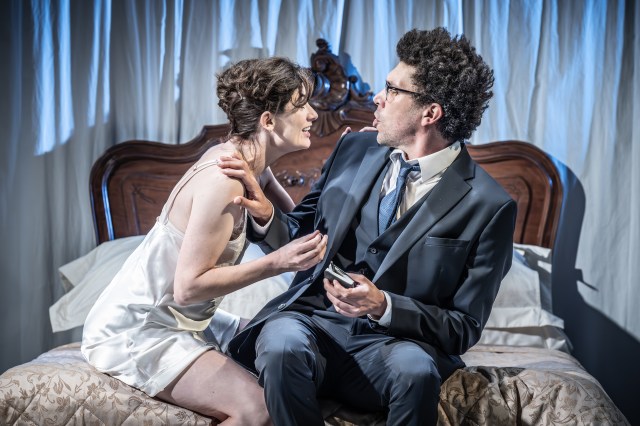The Duchess (of Malfi) review – Jodie Whittaker returns to the stage in an unrecognisable adaptation
It plays at the Trafalgar Theatre until 20 December

Zinnie Harris’s radical reworking of John Webster’s Jacobean gore-fest was first seen in 2019 and comes to the West End starring Jodie Whittaker in her first stage role for 12 years (her last was another classical tragedy, Antigone).
It opens with her singing a cappella, dressed defiantly in red as she refuses her toxically misogynistic brothers’ request to remain demure in the wake of her husband’s death (“I’m not going to stay indoors and wear beige”). Before long she’s secretly proposing to Antonio (Joel Fry), her endearingly nerdy bookkeeper, with whom she goes on to have twins.
This, of course, will sow the seeds of her bloody downfall as her ruthless, psychotic siblings Ferdinand (Rory Fleck Byrne) and the Cardinal (Paul Ready) enact vengeance having been informed of the news of their sister’s remarriage by their spy in the camp Bosola (Jude Owusu). But plotting aside, in most other regards this is a Duchess of Malfi nearly unrecognisable from its original, as Harris refashions the verse into a parable on contemporary patriarchy, replete with f-bombs and graphic sex references.
But for all its admirable boldness, there is something incongruous about seeing this early 17th century drama entirely rewritten for the modern day. For one thing, the strict codes of religion and hierarchy that lie behind – or provide an excuse for – the brothers’ insistence on the Duchess’s chastity, sit at odds with the contemporary setting. Instead, Harris suggests they’re driven by a mix of incestuous desire (more apparent in Byrne’s creepy Ferdinand) and pure sadism (Ready is a study in cold-blooded cruelty). This makes sense to a point, but never quite rings true.
Tom Piper’s mostly white, industrial set, starkly lit by Ben Ormerod, looks aptly akin to a prison or an asylum. When the violence unfolds in the second half it becomes more of a torture chamber for the poor Duchess, who is strangled and drowned in a bath. These moments, during which she is shown a video of her husband and son’s murder, are deeply affecting, although later on the violence becomes increasingly cartoonish and the final scenes are anticlimactic as a result. The decision to have cast members whisper into microphones also feels like overcooking.
The performances, however, are impressive – including Elizabeth Ayodele and Hubert Burton as Julia and Delio, here recast as mismatched spouses. Whittaker in particular reminds us why she’s been such a miss these past dozen years (during which I hear she’s largely been working on arthouse screen projects). She has tremendous poise as well as a sense of searing intelligence, repelling her brothers’ early attacks with sheer charisma. Although this may not be the best use of her talents, it’s great to have her back on stage.
















